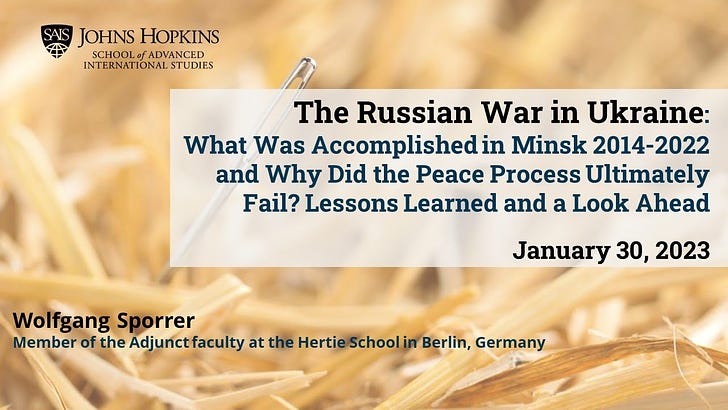Ukraine negotiations: the Minsk Process
Wolfgang Sporrer looks back at the Minsk process, which were aimed at resolving the status of the Russian-controlled Ukrainian areas of Donetsk and Luhansk.1 Those negotiations were unsuccessful. But they are an important precedent for negotiations among NATO countries, Ukraine, and Russia.
The event recap observes:
Sporrer identifies differences in expectations between Russia and Ukraine as a primary cause of this failure. Russia wanted a foothold in Ukraine to control Ukrainian politics, while Ukraine wanted to avoid exactly that type of Russian interference. Additionally, the agreement was weak technically and did not include workable verification mechanisms.
Finally, Sporrer identifies two perspectives on how to get out of this tragic situation. From above, considering the military, legal, and moral circumstances, it is clear that Ukrainian victory appears as the only fair option. However, seen from below, negotiators must search for a pragmatic solution that will minimize human suffering. Professor Sporrer suggests expanding the Istanbul Grain Initiative, which has shown that Ukrainians and Russians can together to find solutions to certain problems. This should serve as a starting point for other conversations that do not require concessions but could provide important benefits, such as implementation of humanitarian ceasefires, a slow restoration of trust as well as an early warning mechanism, therefore reducing the potential of escalation. [my emphasis]2
There seems to be no immediate prospect for real peace negotiations in the Russia-Ukraine War, even after the strange Wagner Group incident in Russia this past weekend.
Neither the Ukrainian nor the Russian side shows any indication that they think they could gain more by a ceasefire and negotiats than by continuing the war.
Sporrer, Wolfgang (2023): The Russian War in Ukraine. JHU BIPR (Johns Hopkins University Bologna Institute for Policy Research) YouTube channel 01/31/2023. (Accessed: 2023-19-05).
The Russian War in Ukraine: What Was Accomplished in Minsk 2014-2022 and Why Did the Peace Process Ultimately Fail? Lessons Learned and a Look Ahead. Bologna Institute for Policy Research 01/30/2023. <https://bipr.jhu.edu/events/4693-Ukraine-Why-the-Minsk-and-Normandy-Processes-Failed-but-on-What-They-Accomplishe.cfm> (Accessed: 2023-14-02).


